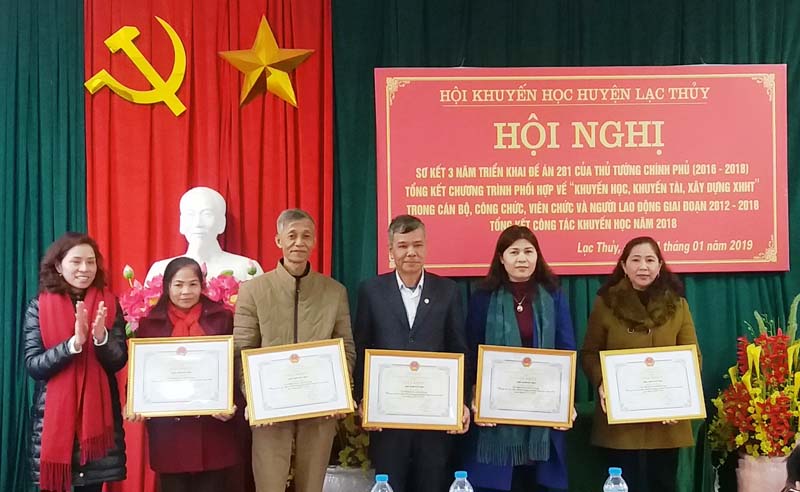
(HBO)- In the past years, the study and talent promotion in Lac Thuy district has received the support of numerous officials, party members and people. Thereby they have contributed to arousing and promoting the studious tradition, creating a learning society in the district.

The leaders from the Commission for Mass Mobilisation of
Lac Thuy People's Committee awarded certificates of merit to the collectives
and individuals who achieved the high achievements in the study promotion over
the past time.
The movements "The sound of Drum for Study
Promotion", "Raising Plastic Pigs for Study Promotion",
"Three Sponsored" and the building the district's study
promotion fund have developed extensively. The development of the fund for the
study and talent promotion have helped and and encouraged students with
difficult situations to overcome challeges and study better. It have been
creating conditions for children with special difficulties to have
opportunities to attend school and timely encourage scientific and technical
initiatives. Thereby it promotes the studious tradition of children of ethnic
groups in the district. Up till now, the district has had more than 10,300
learning families and over 60 family lines study effectively. Typically, the
Bui Van family in Thoi village, Hung Thi commune; Tran family in Ngoc Lam
village, Dong Tam commune; Bui Van family in Dong Rac village, An Binh commune;
Do family in An Ninh village, Phu Lao commune and so on.
In 2018 only, the fund for the study promotion at all
levels in Lac Thuy district has mobilized nearly 1,2 billion VND to award and
give scholarships to students with high achievements in study. During the year,
the Association collaborated with Hanoi Open University to give 250
scholarships and gifts worth 97 million VND to disadvantaged students. On June
1, and on the occasion of academic school year summary, the Study Promotion
Association of communes and towns cooperated with schools to award nearly 8,000
gifts to good students with high study results. With the cooperation and
contribution of all levels of sectors, associations and the whole society, 167
bicycles, more than 300 scholarships and thousands of book bags and helmets
have been awarded to poor studious students at the beginning of the new school
year.
More than just an information technology teacher, Bui Van Nien is an inspiring figure who has nurtured the scientific curiosity and creative spirit of students in Vietnam’s ethnic minority communities.
Da Bac is the most disadvantaged mountainous district in Hoa Binh province, with ethnic minorities accounting for about 90% of its population. Over the past years, the district has mobilised resources to implement ethnic policies to improve the quality of life of local people.
In recent years, Hoa Binh province has consistently prioritised the protection, care, and education of children, particularly those from ethnic minorities and disadvantaged backgrounds, by creating a safe, healthy, and nurturing environment for their all-round development.
The Steering Committee for Tobacco Harm Prevention and Control of Hoa Binh province, in coordination with the Tobacco Harm Prevention and Control Fund, held a ceremony on May 28 in response to the World No Tobacco Day (May 31) and the National No Tobacco Week (from May 25 to 31). The event was chaired by Nguyen Van Toan, Standing Vice Chairman of the provincial People’s Committee and head of the Steering Committee.
Since 2021, the Center for Industrial Promotion and Industrial Development Consulting (CIIDC) under the Department of Industry and Trade has been implementing a school lighting model as part of the plan for using energy efficiently and economically in Hoa Binh Province in the pẻiod of 2021 - 2025. This model not only aims to improve the learning conditions and enhance the education quality, but it also promotes the message of energy saving, energy security, environmental protection and contributes to the goals of socio-economic development.
In the 2024 - 2025 school year, the entire Hoa Binh provincial education sector includes 520 educational institutions and schools. Among them are 13 ethnic boarding schools with 153 classes and 4,487 students. Four of these schools have met national standards, reaching 30.7 percent.



